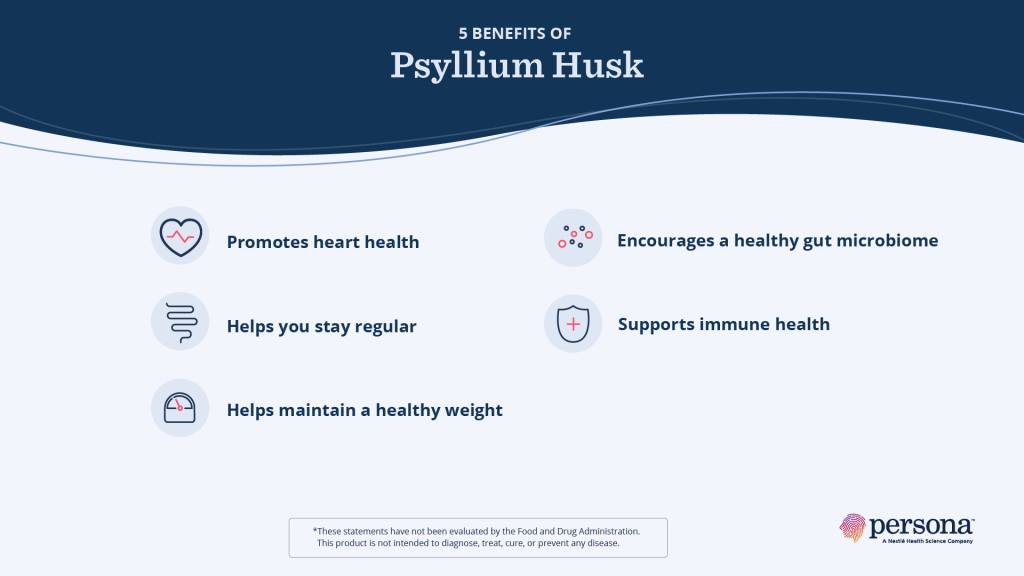You’ve heard it a million times before: fiber is good for your health. And whether you’re feeling a little backed up or simply trying to up your wellness this season, adding psyllium husk (a source of soluble fiber) to your diet can help you take charge of your health.
Read up on the benefits and how to add it to your diet.
First, what is psyllium husk?
Psyllium husk is a soluble fiber derived from the seeds of Plantago ovata, a shrub-like plant grown mainly in India. It’s lauded as a great source of fiber, offering about 7 grams per tablespoon. Psyllium husk is nondigestible, so many of its benefits come from resisting absorption in the small intestine. And because of its water solubility, when consumed, it absorbs liquid, swells and is easily digested by your gut bacteria, offering an array of health benefits.

1. Supports heart health
Heart disease is one of the most common causes of death in the United States, so taking care of your ticker is a must. Soluble fibers like psyllium support your heart by helping to lower total blood cholesterol (a fat-like substance that your liver creates to make cells, vitamins and hormones) levels. How?
Put simply: Psyllium attaches itself to cholesterol and bile salts in your digestive tract and carries them out as waste. To replenish the lost bile salts, your liver uses the cholesterol that’s stored in your body. This means there is less cholesterol building up in your bloodstream. In fact, one study showed that psyllium husk lowered LDL cholesterol by a modest level of 6.7 percent.
2. Helps you stay regular
With many of us not reaching our daily fiber goals, staying regular can be a struggle. Due to its high fiber content, psyllium husk can help keep your bowels moving and grooving by absorbing liquid in your intestines, creating softer stools.
Pro tip: make sure you drink plenty of water if you’re adding psyllium husk to your routine.
3. Supports a healthy weight
Whether you’re aiming to shed a few pounds or simply trying to minimize sugar cravings, psyllium husk can be a wonderful sidekick. Soluble fiber slows down digestion to buffer potential blood sugar spikes that make you reach for those high-sugar snacks. Plus, it aids with feeling fuller longer, which helps with portion control and maintaining a healthy weight.
4. Promotes a healthy gut microbiome
It’s no surprise that fiber-rich foods encourage a healthy gut. Your gut contains trillions of microorganisms that influence the absorption of nutrients, aids in digestion, hormones, mood and much more. But when it’s imbalanced – containing more of the bad than good bacteria, it can lead to a slew of annoying symptoms. Psyllium husk helps maintain a healthy bacterial balance in your gut. It’s a type of prebiotic, meaning it helps nourish and promote the growth of healthy, beneficial microorganisms.
5. Supports immunity
Psyllium husk probably isn’t your typical go-to when you start to come down with a cold, but it may actually help support a healthy immune system. A healthy microbiome is also essential for healthy immune function – your microbiome is responsible for helping your body fend off harmful bacteria, fight infection, and promote healthy tissue and cell growth. After all, about 70 percent of your immune system lives in your gut.
How much psyllium husk should you take?
Combined with a healthy, fiber-rich diet – psyllium husk can help reach your daily fiber goals. Common doses for psyllium husk range between 5-10 grams. And remember, more isn’t always better, taking too much can cause discomfort and reverse the benefits.
Men should aim for 30-38 grams of fiber per day and women 21-25 grams, according to the American Heart Association.
How to add psyllium husk into your diet
Psyllium husk is offered in a variety of forms, including as a powder, capsule, liquid and more. Psyllium fiber powders can be mixed with water or added as an ingredient to recipes like cookies, breads or pasta.
Pro Tip: If you’re just starting to up your fiber intake, to avoid feeling extra gassy or bloated, it’s best to start with a smaller dose and then gradually increase to the daily recommended amounts.
For more fiber-rich foods, watch: https://youtu.be/-dmruaJMpTs
About Gabby
Gabby is a nutritionist with a master’s degree in strategic communications. She loves using her nutrition-fluency with storytelling to encourage positive change. Before Persona, she worked at a mental health clinic helping clients manage stress, anxiety and other mental health issues through diet.
Do you have questions about supplements? Reach out to one of our experts, or take Persona’s free nutrition assessment, and learn exactly what you need to take your wellness to the next level.
*These statements have not been evaluated by the Food and Drug Administration. This product is not intended to diagnose, treat, cure, or prevent any disease.
This information is not intended as a substitute for the advice provided by your physician or other healthcare professional, or any information contained on or in any product label or packaging. Do not use the information from this article for diagnosing or treating a health problem or disease, or prescribing medication or other treatment. Always speak with your physician or other healthcare professional before taking any medication or nutritional, herbal, or homeopathic supplement, or using any treatment for a health problem. If you have or suspect that you have a medical problem, contact your health care provider promptly. Do not disregard professional medical advice or delay in seeking professional advice because of something you have read in this article.

